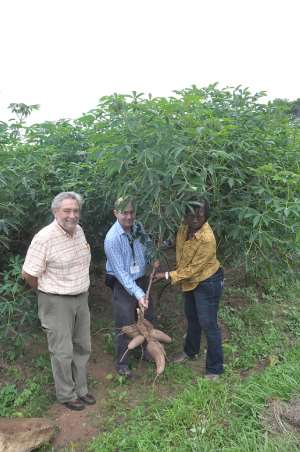
Three newly improved vitamin A cassava varieties with yellow roots have been released by the Nigerian government, stepping up efforts to tackle the problem of vitamin A deficiency especially among women and children in the country. These new varieties were developed jointly by IITA and the National Root Crops Research Institute (NRCRI) Umudike.
The three varietiesUMUCASS 44, UMUCASS 45, and UMUCASS 46are the second in the series of pro-vitamin A varieties released in the country, and are commonly known as NR07/0220, IITA-TMS-IBA070593, and IITA-TMS-IBA070539.
The new varieties have a pro-vitamin A content that averages 10 parts per million (ppm) based on fresh roots as compared to the first series (UMUCASS 36, UMUCASS 37, and UMUCASS 38 commonly known as IITA-TMS-IBA011368, IITA-TMS-IBA1371 and IITA-TMS-IBA011412) that were released three years ago with a pro-vitamin A content of between 6-8 ppm.
Dr Peter Kulakow, IITA Cassava Breeder, said that the development of the varieties demonstrates strong collaboration between scientists at NRCRI and IITA which benefits Nigerian farmers and especially women and children who suffer from vitamin A deficiency.
Afflicting almost 20% of pregnant women and about 30% of children under the age of five, vitamin A deficiency results in stunting in children, predisposes them to sicknesses such as diarrhea and measles, and even premature death. In pregnant women, vitamin A deficiency results in night blindness and increases the risk of mortality.
Measures to address this deficiency include dietary diversity, fortification, supplementation, and now biofortification.
In 2011, researchers from IITA and NRCRI with funds from HarvestPlus developed the first series of biofortified pro-vitamin A cassava varieties to help reduce the incidence of vitamin A deficiency especially in the rural communities.
Dr Chiedozie Egesi, NRCRI Cassava Breeder, said this newer set of pro-vitamin A cassava varieties will play a role in attaining the goals of the Cassava Transformation Agenda of the Federal Government of Nigeria and help improve cassava food products such as gari, fufu, high quality cassava flour, cassava bread, and starch.
'This new set of pro-vitamin A cassava varieties have increased beta-carotene levels as well as matching agronomic characteristics as an incentive for better farmer adoption,' he added.
Prior to their release, participatory varietal trials involving farmers were conducted across 10 states in Nigeria, the world's top cassava producer, cutting across the different agroecological zones.
The varieties have potential yields of 32-36 tons per hectare; they branch either moderately or profusely and possess yellow roots.
Farmers' love for the varieties is helping to increase the acceptance of 'yellow cassava,' Dr Egesi added.
The next steps to rapidly disseminate the varieties include the rapid production of breeders' and foundation seed stock so that commercial farmers will have access to these new varieties.
The development of these newer set of provitamin A varieties demonstrates that plant breeders are not resting. Dr Hernan Ceballos, cassava breeder from CIAT in Colombia has developed biofortified germplasm that IITA breeders are actively using in crosses to select for even higher beta carotene germplasm.
The research was funded by HarvestPlus. Other partners include the International Center for Tropical Agriculture (CIAT), the Brazilian Agricultural Research Corporation (Embrapa), and various Nigerian government agencies.
 HERNAN CEBALLOS (LEFT) CIAT PLANT BREEDER WITH IITA CASSAVA BREEDERS PETER KULAKOW (MIDDLE) AND ELIZABETH PARKES (RIGHT), HARVESTING THE NEW CASSAVA VARIETIES IN IBADAN
HERNAN CEBALLOS (LEFT) CIAT PLANT BREEDER WITH IITA CASSAVA BREEDERS PETER KULAKOW (MIDDLE) AND ELIZABETH PARKES (RIGHT), HARVESTING THE NEW CASSAVA VARIETIES IN IBADAN




 Whoever participated in the plunder of the state must be held accountable – Jane...
Whoever participated in the plunder of the state must be held accountable – Jane...
 A vote for John and Jane is a vote to pull Ghana from the precipice of destructi...
A vote for John and Jane is a vote to pull Ghana from the precipice of destructi...
 I’ll repay your abiding confidence with loyalty, understanding and a devotion to...
I’ll repay your abiding confidence with loyalty, understanding and a devotion to...
 ‘I’ve learnt deeply useful lessons for the future' — Serwaa Amihere breaks silen...
‘I’ve learnt deeply useful lessons for the future' — Serwaa Amihere breaks silen...
 I’m sorry for the embarrassment – Serwaa Amihere apologises for leaked sex video
I’m sorry for the embarrassment – Serwaa Amihere apologises for leaked sex video
 Dumsor: Matthew Opoku Prempeh not in charge of Energy sector – Minority
Dumsor: Matthew Opoku Prempeh not in charge of Energy sector – Minority
 Adu Boahen’s murder: Police arrest house help who was in possession of deceased’...
Adu Boahen’s murder: Police arrest house help who was in possession of deceased’...
 Akufo-Addo nominates Felicia Attipoe as Tema West MCE
Akufo-Addo nominates Felicia Attipoe as Tema West MCE
 Election 2024: I can't have someone I defeated twice as my successor – Akufo-Add...
Election 2024: I can't have someone I defeated twice as my successor – Akufo-Add...
